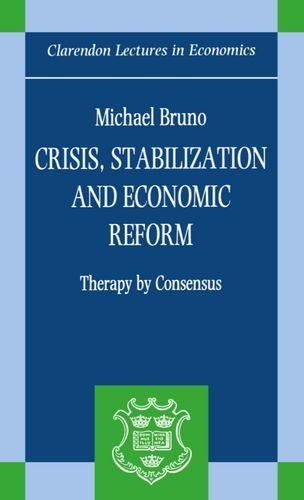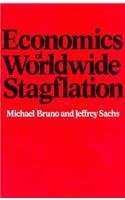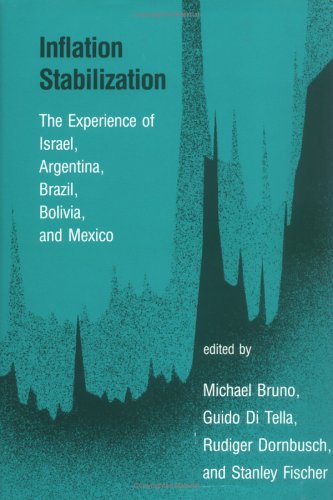Background
Bruno, Michael Peter was born on July 30, 1932 in Hamburg, Germany. Arrived in Israel, 1933. Son of Hans W. and Lotte (Samson) Bruno.


(This book examines the phenomenon of the high inflation p...)
This book examines the phenomenon of the high inflation processes of the 1970s and 1980s as exemplified by Argentina, Brazil, and Israel. It explores the common characteristics of such processes and their possible cures--with some emphasis on the lessons of the Israeli experience in respect of the role of incomes policy and the political economy of stabilization. The discussion of the theoretical underpinnings of "shock" treatments provides a good example for the blending of a number of disciplines: lessons of economic history, open economy monetary and macro theory, game-theory applications to economic policy design (concepts such as dynamic inconsistency, government reputation, and credibility) and the rationalization of incomes policy.
http://www.amazon.com/gp/product/0198286635/?tag=2022091-20

( This book sets forth both a theory and a comparative e...)
This book sets forth both a theory and a comparative empirical analysis of stagflation, that peculiar combination of high unemployment, slow growth, and spurts of high inflation bedeviling the advanced industrial nations during the past fifteen years. The authors first construct a small macroeconomic model that takes full account of aggregate demand and supply forces in the determination of output, employment, and the price level, in both a single-economy and a multi-economy setting. They then apply the model to provide an understanding of comparative performance of industrial countries in the areas of unemployment, inflation, productivity, and investment growth. They argue convincingly that the decay of the major economies during this period resulted from the supply shocks of the 1970s, such as the two major OPEC oil-price increases, and from the consequent policy-induced decrease in demand in response to inflationary pressures. Their analysis differs markedly from similar studies in that it takes specific account of institutional differences in the labor markets of the various economies. This helps to explain in particular the divergent adjustment profiles of the United States and Europe. Bruno and Sachs make several key recommendations for the mix of demand management and incomes policies necessary to combat stagflation in individual countries as well as for the coordination of macroeconomic policies among the major industrial nations.
http://www.amazon.com/gp/product/0674234758/?tag=2022091-20

( Rampant inflation is a major economic problem in many o...)
Rampant inflation is a major economic problem in many of the less developed countries; two out of three attempts to stabilize these economies fail. Inflation Stabilization provides a valuable description and a critical analysis of the disinflation programs introduced in Argentina, Bolivia, Brazil, and Israel in 1985-86, and discusses the possibility of such a program in Mexico. It documents the initial steps in stabilization as well as the reasons for failure.As architects of the programs, several of the authors are in key positions to assess which aspects were critical in getting the programs accepted and where to look for difficulties and failures.In Israel, inflation was halted without recession. The challenge to policy makers today is in shifting from stabilization to the revival of sustained growth. This experience is described fully by Michael Bruno and Sylvia Piterman, who examine the critical issue of exchange rates, and by Alex Cukierman, who uses modeling to analyze the interaction of money, wages, prices, and activity under rational expectations that take the government's policy objectives into account.Endemic inflation and a sudden increase in external debt burden Argentina's economy, raising the wider issues of high inflation economies and stabilization that are discussed in the chapter by José Luis Machinea and that by Guido Di Tella and Alfredo Canavese.Eduardo Modiano and Mario Simonsen take up issues of wages in Brazil, particularly the problem of finding an equitable way to deal with a wage freeze; Simonsen develops an ambitious game theoretic rationalization of incomes policy as a coordinating device for imperfectly competitive economies.Bolivia did reach hyperinflation (price increases of more than 50 percent each month) before stabilizing. Juan Antonio Morales shows how stabilizing the exchange rate, in an economy where all pricing was already geared to the dollar, achieved stabilization without a wage or price freeze. And Francisco Gil Diaz asks whether an incomes-policy based program could work to control ever increasing inflation in Mexico.Michael Bruno is Governor of the Bank of Israel; Guido Di Tella is a Fellow of St. Anthony's College, a Professor at the Di Tella Institute in Buenos Aires, and a Member of Parliament in Argentina; Stanley Fischer is Vice President of Development Economics and Chief Economist at the World Bank. Rudiger Dornbusch is Ford International Professor of Economics at MIT.
http://www.amazon.com/gp/product/0262022796/?tag=2022091-20
Bruno, Michael Peter was born on July 30, 1932 in Hamburg, Germany. Arrived in Israel, 1933. Son of Hans W. and Lotte (Samson) Bruno.
Bachelor in Economics, Cambridge University, England, 1956. Master of Arts in Economics, Cambridge University, England, 1960. Postgraduate, Hebrew University, Jerusalem, 1961.
Doctor of Philosophy in Economics, Stanford University, 1962.
Joint director research Bank of Israel, Jerusalem, 1957-1965, governor, 1986-1991. Lecturer Hebrew University, Jerusalem, 1963-1965, senior lecturer, 1965-1967, associate professor, 1967-1970, professor economics, from 1970. Economic policy adviser to president Ministry of Finance, Government of Israel, Tel Aviv, 1975-1976.
Chief economist, vice president The World Bank, Washington, from 1993. Visiting professor Harvard University, Cambridge, Massachusetts, 1965-1966, 70-71, 76-77, 81, Massachusetts Institute of Technology, Cambridge, 1965-1966, 70-71, 76-77, 81. Director research Falk Institute Economic Research, Israel, 1973-1975.
Research associate National Bureau Economic Research, Cambridge, 1979-1981. Member planning team Israel Stabilization Program, Government of Israel, 1985-1986. Occasional adviser on stabilization programs Governments of Mexico, Yugoslavia and Poland, 1988-1990.
Fellow, Member Council, Vice-President, Econometric Society, 1967,
1967-1968, 1984. Member, Israel American Academy of Arts and Sciences, 1975. Foreign Honorary Member, American Academy of Arts and Sciences, 1982.
Rothschild Prize Social Science,
1974. President, Israel Economics Association, 1977-1979.
( This book sets forth both a theory and a comparative e...)
( Rampant inflation is a major economic problem in many o...)
(This book examines the phenomenon of the high inflation p...)
Author: Interdependence, Resource Use and Structural Change in Israel, 1962, Crisis, Stabilization and Economic Reform: Therapy by Consensus, 1994. (with J. Sachs) Economics of Worldwide Stagflation, 1985. (with G. Ci-Tella, R. Dornbusch and S. Fischer) Inflation Stabilization: Argentina, Israel, Brazil, Bolivia and Mexico, 1988.(with S. Fischer, E. Helpman and N. Liviatan) Lessons of Stabilization and Its Aftermath, 1991.
Early work has concentrated on trade and development issues, structural change and formulation of development policy in open economies. In this context I have applied input-output analysis and linear and dynamic programming methods to the analysis of factor use and shadow pricing, especially of foreign exchange, for investment allocation criteria in an open industrialising economy. During this period (1957-1965) I also contributed to the estimation of production functions, especially under disequilibrium in factor markets.
A visit to Massachusetts Institute of Technology, Cambridge, Mass., USA in 1965-1966 shifted my interests partly into capital and growth theory where I worked on the reswitching problem, optimal growth theory with discrete
technologies, and duality. The next policy-induced research area in the 1970s has been concerned with public economics, in particular the design of income maintenance schemes and tax reform under inflation. Since the mid- 1970s, I have shifted my interests back to trade and macroeconomics of open economies, first working on the dynamics of wage and price adjustment and subsequently on the theoretical and empirical analysis of stagflation in industrial countries.
This has entailed a systematic formulation of the impact of supply shocks in individual economies and on international capital flows as well as an attempt to account for the poor output, productivity and inflation performance of the industrial world in the last decade.
Israel Academy, of Sciences and Humanities. American Academy, of Arts and Sciences. Team formulating economical stabilization programme 1985-1986.
Hiking, music.
Children: Yael, Ido, Asa. Married Netta Ben-Porath Bruno, 1993.
